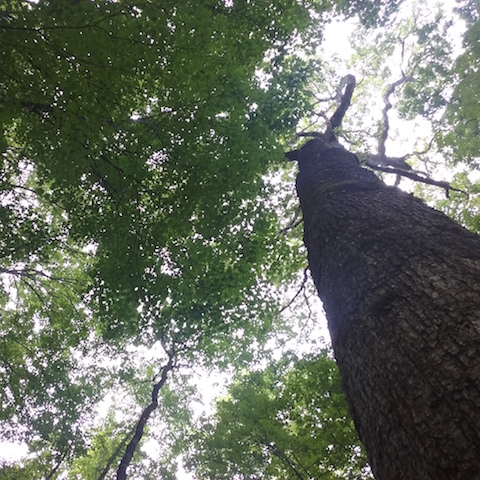AT Lesson #9: Take Care of Yourself and Your Team


The old growth forest reaches heavenward along the peaks and valleys of the Appalachian Trail.
My headlamp shown dimly in the dark moonless night. The trees cast long shadows that faded into the blackness of the dense underbrush. Occasionally I could see a highly reflective strap from another camper’s backpack as I surveyed my surroundings, searching for a place to bed down for the night.
It was midnight and my hiking buddy from Kentucky and I had just arrived at the top of Tray Mountain. We have been treated to a majestic view of the heavenly bodies from one of the highest points in Georgia. Now, having experienced an exhilarating high from summiting such a mountain, I wanted nothing more than to crawl into my hammock and sleep. Fifteen winding miles, several thousand feet of ascents and descents, and 15 hours of backpacking had left me tired. The adrenaline of the final climb had worn off and I was ready to sleep.
I found a spot with two trees 19 feet apart. Not an ideal span for hanging my hammock but it was good enough for tonight. I leaned my pack against a tree and retrieved my sleeping gear.
Gusts of wind whipped through the campsite as I struggled to hang my hammock. Normally quick and easy to set up, I fought to keep my hammock from taking flight in the wind. Once it was secured, I had an even more difficult time with the rain tarp. Eventually, both were fastened and I placed my sleeping bag in the hammock.
I still had not eaten supper. I knew that I should eat. Successful long distance hiking has many facets and one of them is calories. A long day of hiking requires thousands of calories. I estimated that I was burning between 3,500 and 5,000 calories per day. Today was definitely closer to the 5,000 calorie mark, maybe more.
But I was really too tired to setup my stove, wait eight minutes for the water to boil, wait another five of minutes for the rice dish to hydrate, and then clean my cooking gear after I ate. Plus, I only had a half liter of water so all of this would necessitate a one-half mile round trip walk to the spring behind the shelter.
“Forget it. I’m too tired,” I thought. I opened a pack of peanut butter crackers and washed them down with some of my water, leaving enough for a cup of coffee in the morning. Then I turned in for the night.
AT Lesson #9: Take Care of Yourself and Your Team
Sleep came easily, despite the ruffling winds that shook my tarp and prompted the trees to call out in aching moans throughout the night. Morning arrived all to quickly but I awoke refreshed. Little did I know that it was the beginning of the hardest day I would experience on this trip.
I would soon intimately learn the folly of my late night decision. I had gone to bed the night before without giving my body the fuel it needed to recover. I had deprived it of the calories that would help my muscles restore themselves after the long hike. I had valued an extra thirty minutes of sleep over the recuperative nourishment of a meal.
In retrospect, that was penny wise and pound foolish as the saying goes. Sure I got a little more sleep, but I paid a hefty toll the next day.
Before I got halfway down Tray Mountain, I was completely exhausted. I felt like I had already hiked a full day. Checking my watch, I was disillusioned to learn that had only been hiking 90 minutes. I stopped for a snack. It didn’t help. I stopped for a short rest. That didn’t help either. Nothing I did that day could make up for the choice of the night before. I pushed on, willing myself forward despite the drudgery, despite the annoying gnats, despite the lack of energy. Going forward was the only thing to do.
And it wasn’t just me. Although I hiked alone most of the day, I reconnected with my Kentucky hiking buddy late in the afternoon. He had the same experience, only worse. For him, the day was so bad it drove him from the trail. He called for a ride to come get him and he went home just one day after what we both considered one of our best days on the trail.
When life comes at us fast and we get extremely busy, it’s easy to neglect ourselves. It’s tempting to forsake exercise, sleep, or downtime in order to get a couple of more things done. But studies have shown that longer working days do not produce more quality work.
It’s also easy to neglect our families at home and our teams at work, ignoring the personal relationships while focusing on the tasks to be accomplished. We need those relationships. We are designed to be relational and ignoring our relationships will deprive us purpose and meaning.
Sure, there are busy seasons in life when we must make hard pushes to the finish line, but it’s important to not neglect the important things. We must intentionally create margin in our lives.
I’ve also realized that there was a second reason that this day was so tough and I’ll talk about that next time.

One Response
[…] have posted their thoughts on failure recently (Edwin M Sarmiento: Failure is mandatory, Joe Webb: AT Lesson #9: Take care of yourself and your team), here’s what I think. I’m going to fail. Small mistakes and big ones, failure […]